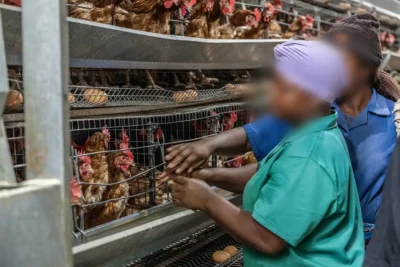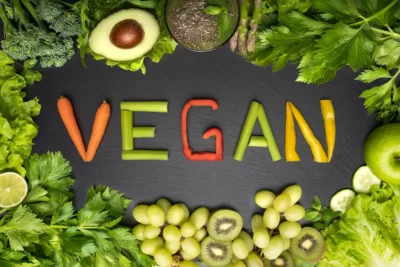The animal farming industry imprisons and slaughters millions of animals every day, often in the worst conditions imaginable. The vast majority are exploited by the largest and most heartless corporations, so it may come as no surprise that their treatment of humans is little better.
Animal Farming and Human Rights
Animal farming industries are responsible for some of the most shocking workplace human rights abuses yet have somehow received much less criticism for their treatment of workers than other industries. In the U.S., there are multiple cases of severe injury, chronic illness, child labor, forced labor, and more each year, all from the largest meat-producing and processing companies.
These producers have taken control of the market, and in their pursuit of vast profits, have turned their back on the wellbeing of the people they employ. Often, the most mentally and physically draining (and worst paid) jobs are done by vulnerable and marginalized people who have few other choices. This can include undocumented migrants, people from the prison system, and people of lower socioeconomic backgrounds. The result is inevitable: avoidable workplace injuries, chronic illness, mental illness, death, disease, PTSD, and more.
Anyone who has bought chicken, pig, cow, or fish meat in the U.S. this year, has most likely bought it from a company responsible for such human rights abuses.
In this blog, we will cover the main human rights issues and some of the stories of individual people affected by this industry, but trust us, this is the tiniest tip of the iceberg. Animal agriculture industries are some of the most exploitative in the world.
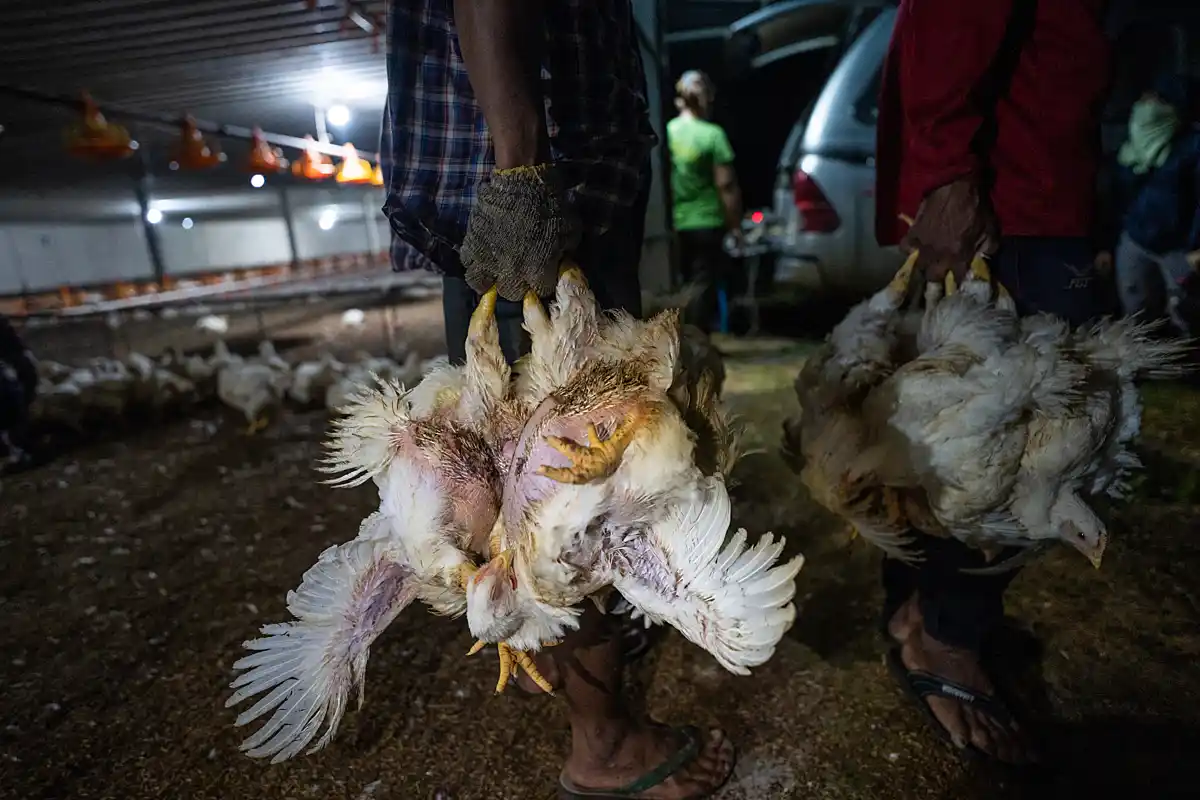
Working Conditions
Some consumers consider the welfare of animals when they buy meat, eggs, or dairy, but few consider the risks and dangers for the humans working in the animal product supply chain. These people face some of the most hazardous, dirty, and dangerous working conditions, often with little or no right to insurance or healthcare, and have to accept unreliable, poorly paid shift work.
A Human Rights Watch report on human rights in the meat industry concluded that animal agriculture has some of the most hazardous workplace conditions across the economy, with alarmingly high rights of injury and death. This is not just down to the nature of the work.
The meat industry has consistently driven higher outputs in pursuit of ever-greater profits, with little thought for protecting the people of their industry. The result is longer operating hours, more cleaning, shorter times to complete the same job and intense pressure to meet unrealistic production targets. If workers cannot meet deadlines, or complain of horrendous conditions, they are often told they can leave.
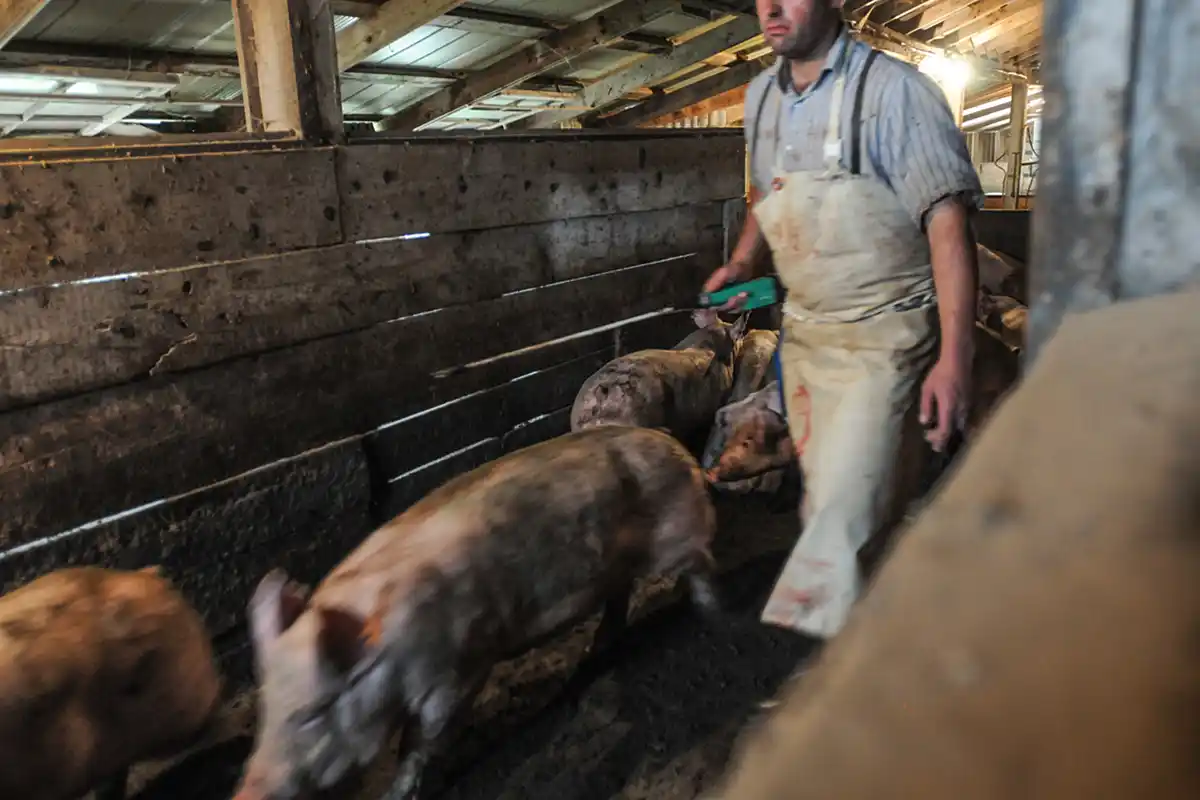
Workplace Injury
The U.S. Occupational Safety and Health Administration (OSHA), reported that a worker in the meat and poultry industry lost a body part or was sent to the hospital for in-patient treatment on average every other day between 2015 and 2018. And this is just the reported data.
For their report, Human Rights Watch interviewed 50 workers from 15 different meat processing plants, owned by 12 different major companies across six states. The majority of them shared experiences of injury and illness as a result of their work. Many showed scars from long-term injuries.
The statistics don’t lie.
- Between January 2015 and August 2018, OSHA received 770 reports of amputations, in-patient hospitalizations, or eye loss from meat and poultry slaughterhouses.
- Among the tens of thousands of companies that reported severe injuries to OSHA, several meat and poultry companies ranked among the highest reporters, despite having significantly smaller staff numbers than those around them.
- Nationwide, between 2004 and 2013, more than 150 workers at meat and poultry slaughterhouses died from work-related injuries — more than one person per month.
Employers must report “severe injuries” to OSHA within 24 hours, but this data does not reflect any of the 22 states that have their own state-based OSHA programs covering private-sector workers, which collect their data on these injuries separately. This data also does not reflect the thousands of agency workers brought in for sanitation and other services.
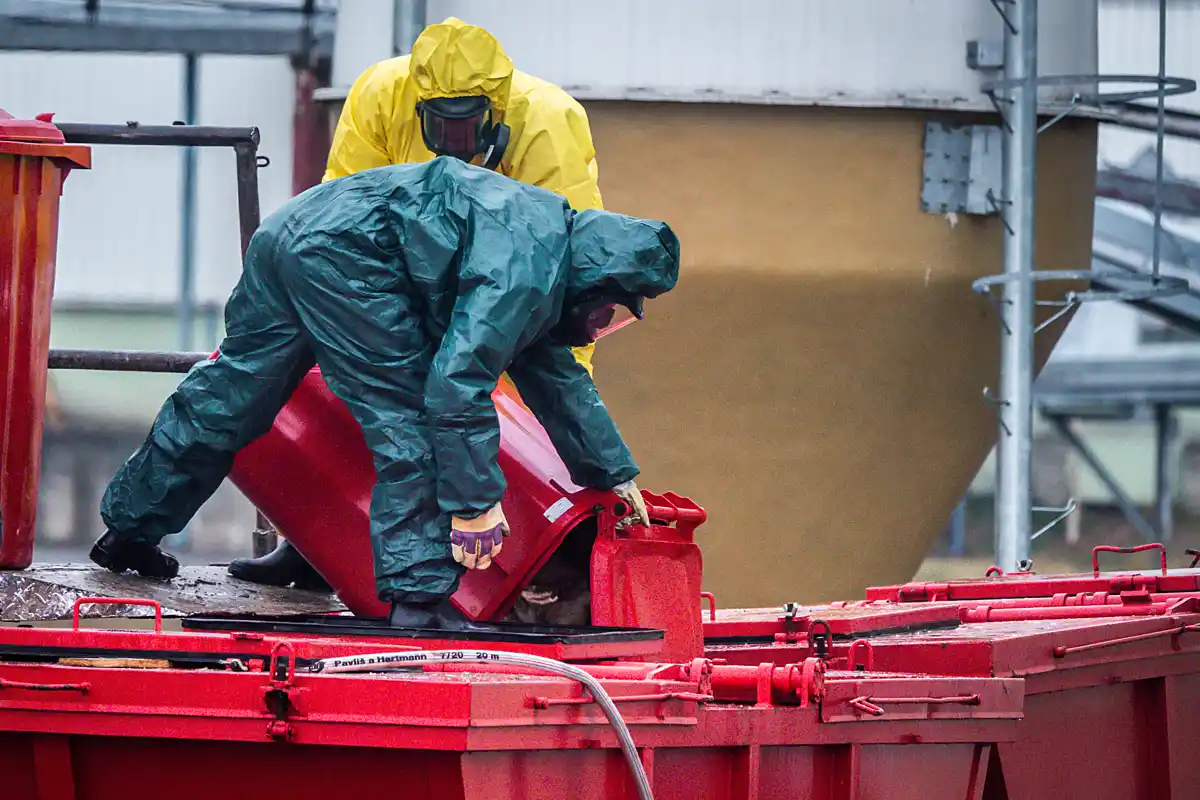
Harmful Exposure to Chemicals
Meat industry workers are often exposed to dangerous chemicals and pollutants. Processing the dead bodies of thousands of animals a day creates harmful and dangerous bacteria and the response is to douse the facilities and products in chemicals. This puts workers at unnecessary risk.
Human Rights Watch shared stories of multiple meat facility workers, particularly in the poultry industry, who have been affected in both the long- and short-term by the chemicals used to sanitize their workspace. Here is one worker’s shocking testimony of a large poultry facility in Arkansas:
“As soon as we entered we would start to tear up.… It was really strong. We felt like we were getting sick—your throat, nose. For me, I would cry. I was always crying. I also had really strong pain in my throat. Some people would get bloody noses… Almost every day it was one person or another [complaining to management]. One pregnant woman went to ask what chemicals they were using and what [they would] do to [her] child [but the company] said that it was within the permitted standards… Their solution is to say: ‘If you don’t want to stay here, go.”
This is a common story within the industry.
The Centers for Disease Control and Prevention (CDC) found that poultry plant workers commonly report stinging or burning eyes, noses, and throats, shortness of breath, asthma-like symptoms, headaches, and nausea. There are currently no legally binding limits for the airborne exposure of workers to harmful chemicals commonly used in the poultry industry.
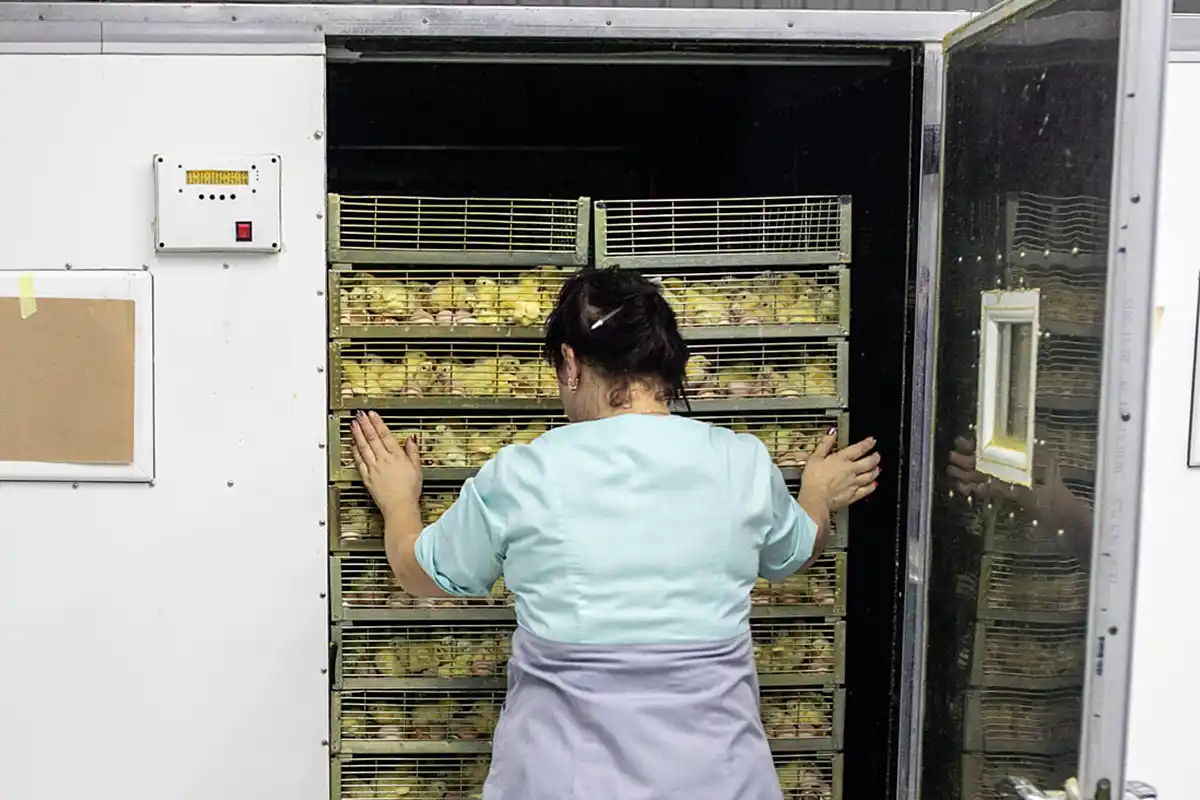
Wages and Work Pressures
Today, on average, meat industry workers receive wages 45 percent below the national average for manufacturing work. This has fallen steadily since 1985, when wages were 15 percent lower.
One reason is that farming animals has become ever-more industrialized and more intensely profit-driven as demand for meat has increased and huge corporations have eclipsed family farms and smallholdings.
Companies such as Tyson Foods, Cargill, JBS, Smithfield, Perdue and others have sought to maximize volume of product and increase profits by pushing production speeds ever faster. This has resulted in low wages and extreme pressure to meet targets, being paired with hazardous and exhausting working conditions.
Vulnerable Labor
Animal agriculture industries consistently take advantage of the poorest and most vulnerable to undertake the most mentally and physically taxing work available. This is because they know there will always be someone out there who needs money to survive, no matter how dirty or dangerous the work is. They are happy to take advantage of this.
Undocumented Migrant Workers
Meat industries feature some of the highest numbers of undocumented workers in the U.S.. For some of the riskiest and dirtiest roles, such as sanitation, they rely on agencies who provide contract workers (often undocumented immigrants) for a fraction of the wage. These agencies pay less, provide minimal insurance, and don’t do proper documentation checks, meaning their workers are incredibly vulnerable. All the while, the meat companies take no responsibility for the risk.
In 2011, Packers Sanitation Services Inc., a sanitation agency employed by Tyson Foods (and many other meat companies all over the country) sent ‘Martha’ to work the graveyard shift at a slaughterhouse in Kansas. As a result of improper training and supervision, her arm was mangled in a machine whilst cleaning it. Packers blamed Martha herself, accusing her of negligence in her work, even though she was executing her work in the same way she had done for the previous 22 months, with no objection from her supervisors. In an attempt to claim compensation, the courts sided with Packers and Martha got nothing.
Since then, Packers have continued on this road of abuse and exploitation. The reason we chose this is example is best explained in the following quote from a Bloomberg article on this case:
“Packers fared better than Martha. On the same day in December 2014 that the Kansas judge rejected Martha’s workers’ comp claim, Packers announced it had been bought by Leonard Green & Partners LP of Los Angeles, its third private equity owner in seven years. The purchase was financed with more than $550 million of debt. This November (2017) — 35 months and at least 19 amputations later — Packers refinanced its loans and paid its investors a dividend of $339 million.”
Martha disappeared after this incident, another undocumented worker whose life has been irreversibly altered at the hands of an exploitative company.
This example perfectly illustrates the lengths to which the meat industry and its chosen associates will go to protect their own profits, likely without a moment’s thought for the thousands of lives they ruin each year.
This long read article from Bloomberg has more information on this heartbreaking story.
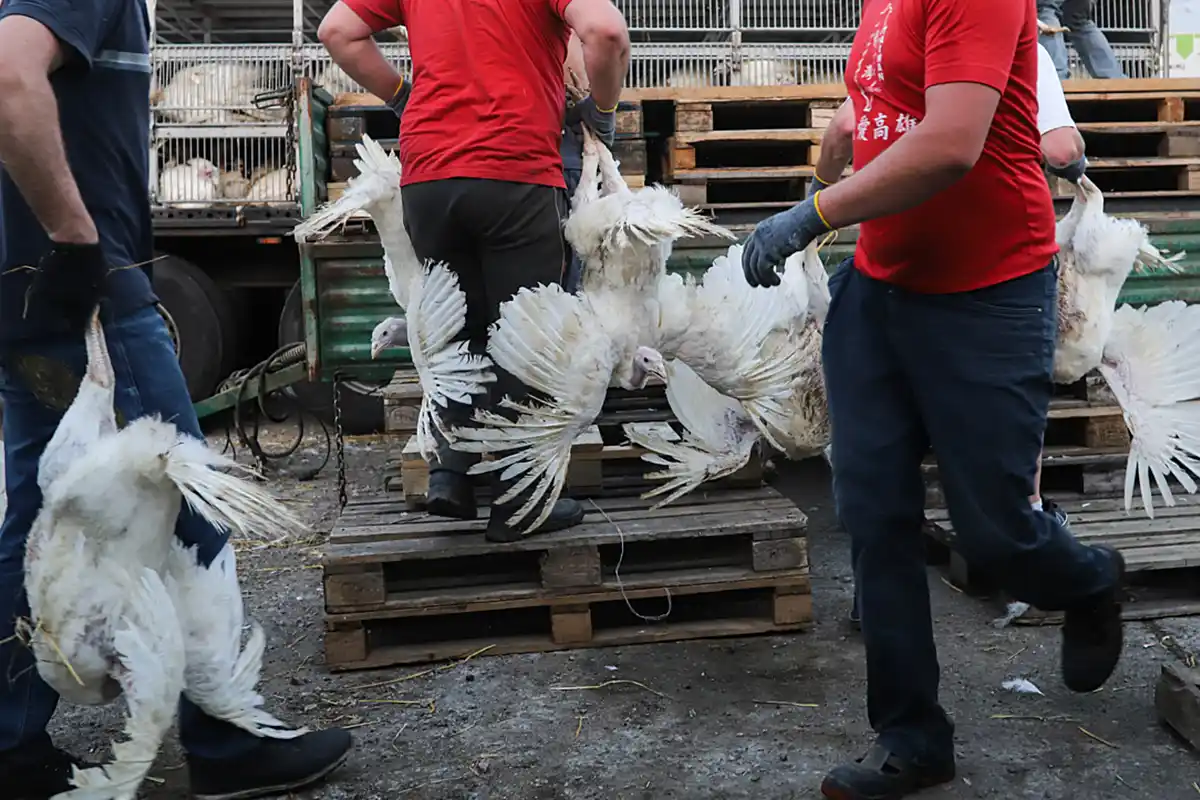
Child Labor
If it’s not exploiting undocumented workers, the meat industry has no issue turning to an arguably even more serious form of exploitation — child labor.
Most Americans would immediately associate child labor with the sweatshop industries of the developing world, blaming clothing brands or tech companies. Little do they know, child labor is happening on home soil, and all too often it is directly connected to their own food choices..
In 2022, the friendly folks at Packers Sanitation Services (yes, them again) were fined $1.5 million by the labor department for employing at least 102 13-17-year-olds across eight states, all in slaughterhouses operated by huge meat industry corporations like JBS, Tyson, and more.
Shannon Rebolledo of the labor department said this incident was by no means unusual and that this is standard operating procedure for these kinds of contractors.
Forced Labor
When the industry is not exploiting undocumented workers or children, they may turn to vulnerable people in the justice system. In 2010, Oklahoma judges began giving non-violent offenders the option of attending drug and alcohol rehabilitation camps instead of short prison sentences. One man, Brad McGahey, convicted on a charge of buying a stolen trailer, was given the option of attending CAAIR, a Christian rehab center, even though he had no drug or alcohol addictions. To him, it sounded better than prison, but he was wrong.
CAAIR turned out to be a legal work camp where residents were sent to local poultry slaughterhouses to work 12-hour shifts, six days a week, for little to no pay. Between work, the men received some low-level rehabilitation that most of them didn’t need, and basic meals.
Poultry companies like Tyson and Simmons Foods have benefited enormously from schemes like this. They have laid off full-time employees in favor of this cheap labor, while the rehab center receives money from the government and pockets the wages of the men working at the poultry plants. They have even been accused of taking the settlement money awarded to people who were injured on the job.
Conditions at CAAIR and the poultry slaughterhouses are dehumanizing with workers saying they are consistently threatened with prison if they don’t work hard enough. Brad McGahey was severely injured by a malfunctioning machine at the slaughterhouse and instead of receiving medical care, he was accused of laziness and intentionally injuring himself to avoid work. He ended up back in prison.
This is just one story of thousands of men who have been sent to CAAIR and similar facilities. These systems are endorsed by state governments and of course meat companies and they continue to operate to this day.

Marginalized Communities
It’s no coincidence that the highest concentration of intensive farms in the U.S. are located in poorer, more vulnerable communities. This has been tactically thought out by the meat industry, so that they can outsource the hugely negative impacts of farming operations to communities with little resilience or power to fight against them.
Extreme environmental pollution of air and water, and the resultant negative health outcomes for local people is the most common story, and there are many examples. The story of pig farming in Duplin County, North Carolina, however, provides perhaps the most shocking insight into how the meat industry treats marginalized communities.
The predominantly Black, Latinx, and Indigenous community of Duplin County woke up one day to hog farms moving uninvited into their county, often onto land purchased by their grandparents after their release from slavery. Since then, they have lived with the stench of pig urine and feces, their water tainted and undrinkable, their local wildlife destroyed, and rates of cancer and other chronic illness booming. The industry does everything it can to quash any fight put up by these brave communities.
Ours is a very short synopsis of this very moving and complex story. If you would like to learn more about it head here to watch the fantastic documentary The Smell of Money.
Conclusion
Human rights violations in the meat industry are all too common, and far too little has been done to hold this exploitative industry to account. Governments do not enact sufficiently robust regulations, regulators often fail to enforce the laws that do exist, and courts hand down affordable fines if ever a company is brought before them.
Corporate lobbying and corruption within the meat industry is rife, and has successfully kept the profits flowing in for shareholders, despite the enormous costs to people, animals, and the planet.
The industry also works hard to influence how the public sees them. It purposefully cultivates an image of heroic essential workers caring for happy animals on idyllic farms. But none of this is true. If we saw these vast corporations locking up billions of animals inside disgusting factory warehouses, and forcing workers to risk their lives every day for appalling pay, would we think so kindly of them? Would we keep supporting them?
Organizations like Human Rights Watch and independent journalist outlets are doing their best to report on the horrors for people affected by the meat industry, but we can all do our part to help. By choosing to avoid animal products, we hit corporations where it hurts: their profits. By abstaining from buying meat, milk, and eggs, we stand up for a better world for some of the most vulnerable people, while also sparing the lives and suffering of animals and better protecting our planet.
